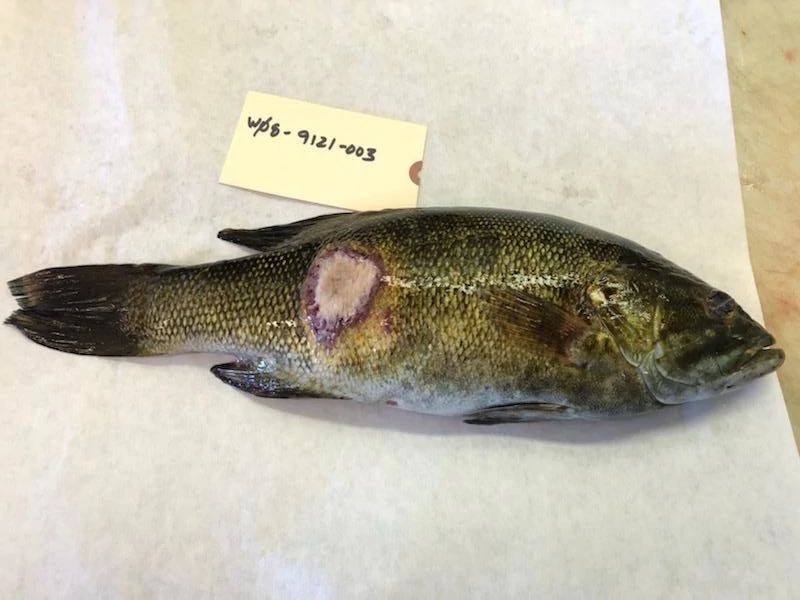Contact: Scott Hansen, DNR Fisheries Biologist
Scott.Hansen@wisconsin.gov or 920-559-3474
Dr. Nicole Nietlisbach, DNR Aquatic Veterinarian
Nicole.Nietlisbach@wisconsin.gov or 608-886-0486
Smallmouth Bass In Door County Waters Test Positive For Largemouth Bass Virus
 DNR confirms recent discovery of largemouth bass virus in smallmouth bass taken from Door County waters.
Photo credit: Wisconsin DNR
DNR confirms recent discovery of largemouth bass virus in smallmouth bass taken from Door County waters.
Photo credit: Wisconsin DNR
MADISON, Wis. – The Wisconsin Department of Natural Resources (DNR) confirms largemouth bass virus in smallmouth bass taken from the bay of Green Bay near Door County.
In September 2021, 14 diseased smallmouth bass were collected from the waters surrounding Door County and examined by DNR fisheries staff. Collected fish had skin wounds that appeared red, ulcerated, and varied in size and location. These skin lesions often had a cream-colored layer of dead tissue in the center of the wound.
Since 2008, smallmouth bass displaying similar skin lesions have been sampled during several outbreaks in Lake Michigan and Green Bay waters. While test results from fish sampled during those episodes had been inconclusive, the virus was detected in all 14 of the diseased fish sampled this year.
Largemouth bass virus has been found throughout the Eastern United States and previously identified in Wisconsin’s Mississippi River Basin. The virus can cause weakness, abnormal swimming, swimbladder over-inflation, reddening and death in largemouth bass populations.
While it is suspected that largemouth bass virus is involved in the development of the skin lesions on the 14 smallmouth bass, little is definitively known about its ability to cause disease or death in the species. DNR staff will continue to monitor smallmouth bass populations and collect additional samples to confirm largemouth bass virus in future outbreaks.
To avoid spreading largemouth bass virus and other harmful pathogens, anglers should follow the DNR’s aquatic invasive species guidance and actively practice the following:
- Drain all water from boats, motors and all equipment.
- Do not move live fish away from a waterbody.
- Handle bass as quickly and gently as possible if you intend to release them.
- Target smallmouth bass during cooler weather to reduce the stress on fish.
- Refrain from hauling fish in live wells unless fish are to be harvested.
- Report smallmouth bass with skin lesions and dead or dying fish to local biologists or fish health staff.
While largemouth bass virus is not known to infect humans, the DNR urges anglers harvesting any fish to thoroughly cook their catch, never consume dead or dying fish and follow the Center for Disease Control’s food safety guidelines.

